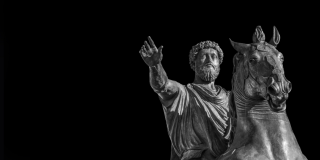What you'll learn
Learn to answer fundamental questions about life with our philosophy short courses online & in Sydney.
Over this five-week Philosophy course, you will be given an overview of the key insights made by some of the most influential modern Philosophers. This course will help you to discover the thinkers that have had a major impact, not only on the field of Philosophy but also on all of the social sciences, and the intellectual development of western society generally.
This Philosophy course will introduce you to the concepts of liberty, utilitarianism, free will, power and society, existentialism as well as rationality in human nature. We will help you to understand how some of the most prominent modern thinkers since the Renaissance thought about the world, human behaviour and life itself.
Learning outcomes
By the end of this philosophy course, you should be able to:
- Gain insights into the theories and writings of some of the most prominent modern Philosophers
- Think critically about the concepts of rationality, free will, existentialism and power and how these beliefs have informed our thinking
- Understand the impact modern Philosophers have had on the development of Western society
Course content
What will be covered in this philosophy course?
Week 1
Georg Hegel - Metaphysics of the other: Hegel believed "the rational alone is real", which means that all reality is capable of being expressed in rational categories. His goal was to reduce reality to a more synthetic unity within the system of absolute idealism.
John Stuart Mill - Liberty and utilitarianism: Mill believed that the goal is to justify the utilitarian principle as the foundation of morals. This principle says actions are right in proportion as they tend to promote overall human happiness. The action which achieves the greatest amount of good for the most amount of people is the right action.
Week 2
Karl Marx - On alienation: Marx believed that no economic class, be that wage workers, landowners, etc., should have power over another. Marx believed that everyone should contribute what they can, and everyone should get what they need. His most famous book was the Communist Manifesto.
Arthur Schopenhauer - The world as will and idea: Schopenhauer believed that will is the 'inner essence' of the entire world, and he claimed that humans have absolutely no free will. They are completely determined by the way that their bodies react to stimuli and causes, and their characters react to motives.
Week 3
Freidrich Nietsche - The will to power: Nietzsche's philosophy contemplates the meaning of values and their significance to human existence. Given that no absolute values exist, in Nietzsche's worldview, the evolution of values on earth must be measured by some other means.
Martin Heidegger - Human 'being-in-the-world': Heidegger's groundbreaking work in ontology (the philosophical study of being, or existence) and metaphysics determined the course of 20th-century philosophy on the European continent and exerted an enormous influence on virtually every other humanistic discipline, including literary criticism, hermeneutics, psychology, and theology.
Week 4
Jean-Paul Sartre - Free will and existentialism: Sartre's theory of existentialism states that “existence precedes essence”, that is only by existing and behaving a certain way do we give meaning to our lives. According to him, there is no fixed design for how a human being should be and no God to give us a purpose.
Week 5
Jurgen Habermas - Rationality and human nature: Habermas' theories are devoted to revealing the possibility of reason, emancipation, and rational-critical communication possible in modern institutions and in the human capacity to deliberate and pursue rational interests.
Intended audience
Who is this philosophy course for?
This philosophy course is for anyone interested in using critical thinking and logical analysis to understand the guiding principle for human behaviour.
Course testimonials
-
Jane said: Well presented introduction to some of the great modern philosophers
-
Erin said: Very engaging and informative tutor was great
-
Mike said: Tutor really knows his stuff. He is passionate and communicates difficult concepts clearly and helpfully.
-
Anne said: The tutor had a great style, which explained the material clearly while giving the students opportunities to comment and participate. He asked good questions of the group and encouraged discussion.
-
Gail said: Excellent course. The tutor was very knowledgeable and was able to communicate very complex ideas easily. The class discussions were fun and I would recommend this course to anyone looking to expand their worldview.
Great reasons to enrol in a short course with us
Small classes
A personal approach means quality learning, so you can enjoy plenty of interaction with your instructor and the chance to ask questions.
Short & sweet
Our short courses & workshops get straight to the point, providing the skills you need with minimal commitment of your precious time.
Facilities & equipment
Our range of venues suit every type of course, are easy to get to, and have the equipment and tech needed to support your learning.
Easy, secure enrolment
Enrol online 24/7 with a safe, convenient 3-step process, and you can change your mind up to 7 days before class starts.
Quality instructors
Our educators bring first-hand experience and knowledge, with up-to-the-minute practices from diverse industries.
Business or pleasure
Our courses help you rapidly increase your skills and knowledge, for professional development or personal interest.
4.7 starsaverage rating on Google
1,400+courses to choose from
99%customer support rating
This course has no current classes. Please join our waitlist and we will notify you when we have places available. Join waitlist for Philosophy Course: The Great Modern Philosophers
This course has no current classes. Please join our waitlist and we will notify you when we have places available. Join waitlist for Philosophy Course: The Great Modern Philosophers






